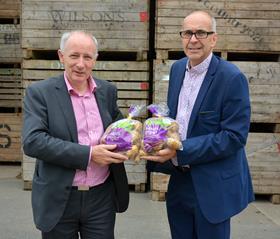
Northern Ireland’s maincrop potatoes are being harvested two weeks ahead of schedule thanks to a year of perfect growing conditions.
The favourable conditions also contributed to an overall five per cent increase in the total acreage of potatoes grown in the country, a trend replicated in the Republic of Ireland and in Great Britain.
Each year potatoes are sold into 96.6 per cent of Northern Ireland homes, where consumers spend around £42 million on the favoured vegetable.
Consumers in the Republic of Ireland spend €180m on potatoes, which enjoy a 97 per cent penetration into Irish households.
Angus Wilson, chief executive at growers Wilson’s Country in Portadown, said the first potatoes will be harvested during the second week of July. “This is almost a fortnight ahead of the usual start date to the season,” he said. “As a result of the mild spring, crops were planted early and soil conditions have remained excellent.
“The combination of heat, sunlight and moisture that has characterised the weather over recent weeks has ensured that growth rates have been well above average.”
Wilson also reported there were no carryover stocks of ware potatoes from last year, which meant a clean slate for this year’s harvest. He added: “The potato year begins, to all intents and purposes, on 1 June. The good news for farmers is that there are no carryover ware stocks from the 2016 season. So, essentially we are starting from scratch in 2017.
“The increase in acreage would point to a degree of speculative growing by farmers, who are not specialist producers. There is also some evidence of traditional potato growers planting larger areas this year. But the increase in acreage will not automatically translate into an equivalent increase in tonnage later in the year. The weather from now until harvest time will determine the final size of the 2017 crop.
“Yields are a factor in this equation as will be farmers’ ability to get potatoes actually lifted, should the weather turn bad. Disease can also be a factor, where yields and tuber quality are concerned.”
However, Wilson warned that the good growing conditions and increased acreage could potentially mean an oversupply of potatoes, which may hurt prices.
“The market is finely balanced. It would take only a small degree of oversupply to have a severe impact on grower returns,” he said.
Potato eating trends are also changing, with a spurt of growth being witnessed in the chilled potato convenience category.
Lewis Cunningham, managing director at Wilson’s Country, pointed out that the latest Kantar figures confirm a slight decline in local fresh potato sales. “The total value of fresh potato sales in Northern Ireland for the year May 31 2017 was £42.19m,' he continued. “Volume sales on the year are also slightly down by a small percentage amount during the same period, with total fresh potato sales amounting to 55,963 tonnes.
“When we analyse the detail of the figures it is very clear that the reason for the slight decline in 2017 was lower than normal sales during the winter trading period.
“When we review the weather last year, we had a very mild 2016 autumn and winter really never arrived in 2017 so likely to be less hearty dinners, soup and stews on the menu compared to previous years and hence a reduced potato consumption.
In contrast, he said, the market for convenience, prepared potato products is delivering double-digit growth. “The sector mainly comprises mash, baby potatoes with flavoured dressings and also fresh peeled and chipped potatoes. In the GB market the value of the chilled, convenience potato products sector is now equivalent to 20 per cent of that generated by the entire fresh potato market in the UK. Consumers want convenience, when it comes to all of their cooking practises. And potatoes are no different in this regard.”
Wilson’s Country now operates a ‘zero waste to landfill’ policy, as Cunningham explained: “This is at the very heart of our plans to deliver ongoing sustainability for the business.
“Potatoes not suitable for our pre-pack markets, for example that may have skin blemish, can go to our processing facility and be peeled or cooked while remaining potatoes not suitable for packing or processing can go for livestock feeding.
“We also produce considerable quantities of starch and it is hoped that this starch will be used to produce a biogas supply to generate electricity for the site.”



